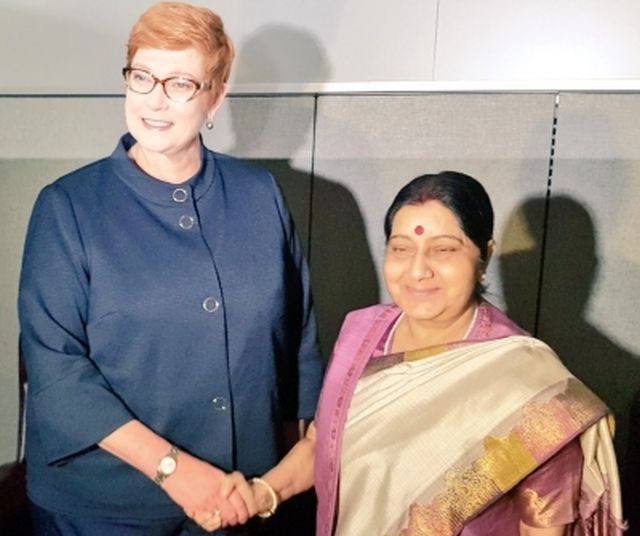
by Editor | May 25, 2021 | Business Summit, Corporate, Corporate Governance, Events, News, Politics, Social Round-up
 By Arul Louis,
By Arul Louis,
United Nations : External Affairs Minister Sushma Swaraj met nine leaders from across the globe in a whirlwind of bilateral interactions and spoke at the Nelson Mandela Peace Summity.
She began her day on Monday by attending the high-level event on counter-narcotics convened by US President Donald Trump, where she was seated at the front row.
India is one of 129 countries that have signed the pledge drafted by Trump on commitment towards international fight against drugs.
Although it was not a formal meeting, she greeted Bangladesh Prime Minister Sheikh Hasina when she came to the UN, India’s Permanent Representative Syed Akbaruddin tweeted.
Sushma Swaraj met the Foreign Ministers of Australia, Spain, Ecuador, Colombia, Mongolia, Nepal, Morocco, Lichtenstein and Federica Mogherini, the European Union (EU) High Representative for Foreign Affairs.
The topics discussed during the meetings with the foreign ministers depended on the relations with those countries and ranged from strategic cooperation to trade and investment.
Meanwhile, Foreign Secretary Vijay Gokhale participated in the Special Meeting of the Conference on Interaction and Confidence Building Measures in Asia (CICA) — a 26-member forum for cooperation in promoting peace, security and stability in Asia.
Ruchi Ghanashyam, the Secretary (West), spoke at the Africa Adaptation Initiative High-Level Roundtable. The organisation aims at facilitating finance and cooperation for the continent’s development.
After Sushma Swaraj’s meeting with Australian Foreign Minister Marise Payne, External Affairs Ministry spokesman Raveesh Kumar tweeted: “Strategic partnership gaining momentum!”
The two countries have been building up their strategic relations reinforced by the Quadrilateral Security Dialogue that includes the US and Japan.
Closer to home was the meeting with Nepal’s Foreign Minister Pradeep Kumar Gyawali, which “took stock of our bilateral relationship”, Kumar tweeted.
At the meeting with Ecuador Foreign Minister Jose Valencia Amores, there were “good discussion on ways to further consolidate bilateral relationship in the areas of trade, agriculture, pharma, IT and capacity building”, according to Kumar.
Also from Latin America, Colombia’s Foreign Minister, the discussions centred on cooperation on trade investment, pharma, mining, petroleum and capacity building, he tweeted.
With Spanish Foreign Minister Josep Borrell, Sushma Swaraj “explored ways to intensify ties in investment, renewable energy, water treatment, tourism and their contribution to our flagship initiatives”, according to Kumar.
Mogherini and Sushma Swaraj “discussed issues related to trade and investment and exchanged views on the regional and global issues,” Kumar said in a tweet.
He noted that India and the EU were bound by a “strategic partnership based on common values of democracy, freedom and rule of law.”
“Celebrating the 25th anniversary of our diplomatic relations” Sushma Swaraj and Lichtenstein Foreign Minister Aurelia Frick “exchanged views on enhancing bilateral relations in trade and investment, particularly through participation at Indian trade fairs and tourism,” Kumar tweeted.
On relations with Morocco, he noted that they stretched back to the time of Ibn Battuta, the 14th century explorer, and tweeted that Sushma Swaraj and “Morocco Foreign Minister, Nasser Bourita discussed strengthening cooperation in areas of commerce, pharma, cyber security, defence and culture”.
She also met with Mongolian Foreign Minister Damdin Tsogtbaatar.
The High-Level General Assembly session begins on Tuesday.
On the sidelines, she was to meet Fiji Prime Minister J.V. Bainimarama and the Foreign Ministers of Iraq, Cyprus, Moldova and Estonia.
(Arul Louis can be reached at arul.l@ians.in and followed on Twitter at @arulouis)
—IANS
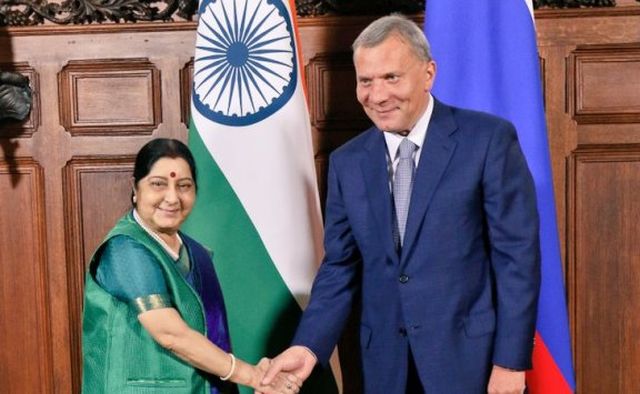
by Editor | May 25, 2021 | Corporate, Corporate finance, Corporate Governance, Finance, Investing, News, Politics
 Moscow : India and Russia have set a new two-way investment target of $50 billion by 2025 following a meeting between Indian External Affairs Minister Sushma Swaraj and Russian Deputy Prime Minister Yury Borisov here on Friday during which bilateral cooperation across various sectors was reviewed.
Moscow : India and Russia have set a new two-way investment target of $50 billion by 2025 following a meeting between Indian External Affairs Minister Sushma Swaraj and Russian Deputy Prime Minister Yury Borisov here on Friday during which bilateral cooperation across various sectors was reviewed.
Addressing the media after co-chairing with Borisov the 23rd India-Russia Inter-Governmental Commission on Technical and Economic Cooperation (IRIGC-TEC), Sushma Swaraj said in 2017, the annual trade between India and Russia reached $10.17 billion.
“We discussed ways and means to increase this momentum, ensure balanced trade and remove barriers to trade,” she said.
“Two-way investments have already crossed the $30-billion target, which we had set for 2025.
“We have therefore proposed that we enhance this figure to $50 billion by 2025.”
IRIGC-TEC is a standing body which annually meets and reviews ongoing activities of bilateral cooperation.
The Commission, after taking stock of bilateral cooperation in various fields, provides policy recommendations and directions in the fields concerned.
Friday’s meeting prepared the groundwork for the annual India-Russia bilateral summit between Indian Prime Minister Narendra Modi and Russian President Vladimir Putin, to be held in New Delhi next month.
Russia is one of only two countries with which India holds annual bilateral summits, the other being Japan.
The India-Russia bilateral relationship was elevated to Special and Privileged Strategic Partnership in 2010.
Modi and Putin have already met twice this year — at an informal summit in the Russian resort city of Sochi in May and then on the sidelines of the BRICS (Brazil, Russia, India, China and South Africa) Summit in South Africa in June.
In her address, Sushma Swaraj said in the IRIGC-TEC meeting, both sides discussed the possibilities of working together on projects in third countries as a new dimension of the strategic partnership.
Pointing out that there has been significant expansion in cultural and tourism exchanges, she said: “Tourism flows in both directions has shown impressive growth. We are working on further liberalising visa regulations on both sides.”
In this connection, she also welcomed the initiative of the Russian government to enable electronic visas for Indian nationals visiting the Russia “far east”.
With energy being traditional area of cooperation, Sushma Swaraj said that earlier this year the first shipment of liquefied natural gas (LNG) from Russia reached India “in a new breakthrough of our energy partnership”.
“We have identified new areas of cooperation such as agriculture, infrastructure, transport and science and technology,” she said.
“We would like to expand our cooperation in the area of space.”
The Indian Minister also said that both sides have agreed to organise the first-ever India-Russia Business Summit involving major companies from both countries in early October in India.
Soon after her arrival here on Thursday, Sushma Swaraj met Russian Foreign Minister Sergey Lavrov and according to Indian External Affairs Ministry spokesperson Raveesh Kumar, both leaders had a good exchange of views on bilateral and regional issues.
—IANS
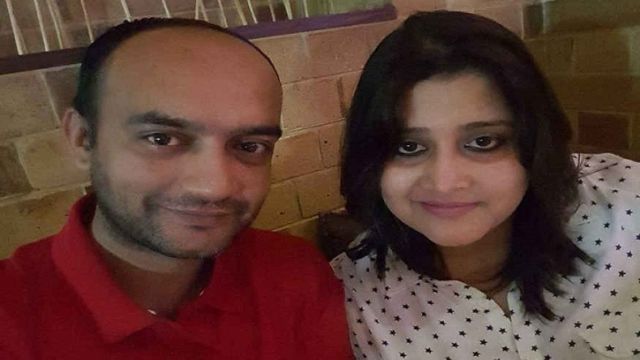
by Editor | May 25, 2021 | News, Politics
 Lucknow : A Hindu woman married to a Muslim got her passport on Thursday, following External Affairs Minister Sushma Swaraj’s intervention, barely 24 hours after a passport officer rejected her application on the grounds that she had not changed her surname.
Lucknow : A Hindu woman married to a Muslim got her passport on Thursday, following External Affairs Minister Sushma Swaraj’s intervention, barely 24 hours after a passport officer rejected her application on the grounds that she had not changed her surname.
Regional Passport Official Piyush Verma on Thursday gave the passport to Tanvi Sethi while the passport of her husband Mohammad Anas Siddiqui was renewed and also handed over.
Sethi alleged misbehaviour by passport officer Vikas Mishra on Wednesday when she had gone to the passport office here. She said her passport application was rejected on the grounds that she had not changed her surname even after 12 years of marriage to a Muslim man.
She later tweeted to the Prime Minister’s Office (PMO) and Sushma Swaraj with her complaint. Both responded to her plea.
Passport officer Mishra has since been transferred to Gorakhpur and an explanation has been sought from him, an official told IANS.
Sethi and her husband said they were very happy at the alacrity with which the PMO and the MEA responded.
The officer accused of misbehaviour, however, denied the charges and said he had only told Sethi of the rules laid down in such cases.
Senior officials said that old rules mandated that a marriage certificate be produced in cases of inter-religious marriages during the passport application procedure, though adding that the officer was not right in ill-treating the woman and shouting at her.
—IANS
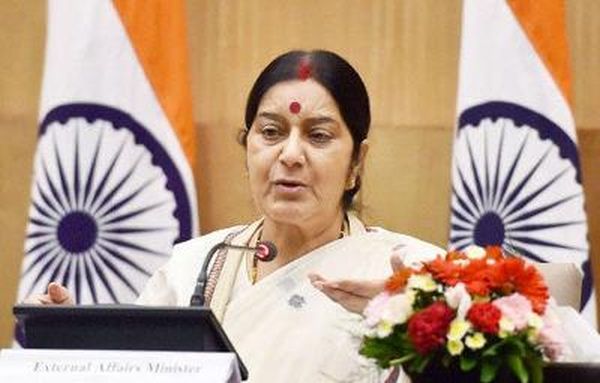
by Editor | May 25, 2021 | Corporate, Corporate Governance, Investing

Sushma Swaraj
New Delhi : External Affairs Minister Sushma Swaraj on Monday said that her ministry’s economic diplomacy attracted $209.83 billion for India’s flagship development programmes.
“Diplomacy for development was never there in our foreign policy,” Sushma Swaraj said while addressing her annual press conference here.
“We not only adopted this but took on our shoulder the responsibility of all our Prime Minister’s flagship programmes – Clean India, Skill India, Digital India, Start-up India, Smart Cities – and are working with those countries which have not only the necessary techniques in the respective areas but can also contribute funds for these,” she stated.
“Today, I am happy to inform you that from May 2014 to February 2018, funds worth $209.83 billion have come to this country.”
She also said that the External Affairs Ministry also created two new divisions for this – Department of Economic Diplomacy and Department of States – and merged both of them.
“This is because these funds will at the end only go to our states,” she said.
“So there can be a joint secretary who can maintain ties with the states as well as look after economic diplomacy.”
—IANS
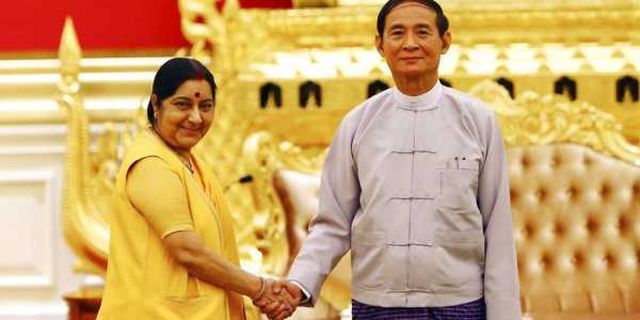
by Editor | May 25, 2021 | Corporate, Corporate Governance, News, Politics

Myanmar’s President Win Myint, right, shakes with visiting Indian External Affairs Minister Sushma Swaraj during their meeting at the President House in Naypyitaw, Myanmar.
New Delhi : India and Myanmar discussed a range of bilateral issues and signed seven agreements during External Affairs Minister Sushma Swaraj’s two-day visit to the country that concluded on Friday.
During the visit, Sushma Swaraj called on Myanmar President U Win Myint, State Counsellor and Minister for Foreign Affairs Aung San Suu Kyi and Commander-in-Chief of the Myanmar Defence Forces Senior General Min Aung Hlaing.
According to a statement issued by the External Affairs Ministry here, during the bilateral meetings, boundary and border related issues, peace and security matters, developments in the Rakhine State, including return of displaced Rohingya persons, India’s development assistance to Myanmar, ongoing projects, and other issues of mutual interest were discussed.
The seven agreements signed included one on land border crossing, memorandums of understanding (MoU) on restoration and preservation of earthquake-damaged Pagodas in Bagan, assistance to the Joint Ceasefire Monitoring Committee, training of Myanmar foreign service officers, setting up an Industrial Training Centre (ITC) at Monywa, and ITC at Thaton and exchange of letters on extending a maintenance contract for ITC Myingyan.
According to the ministry statement, the agreement on land border crossing “is a landmark in bilateral relations between the two countries as it will enable people from both countries to cross the land border with passport and visa, including for accessing health and education services, pilgrimage and tourism”.
“The MoU on restoration of pagodas at Bagan underlines the enduring cultural and historical links between the two countries,” it stated.
“The other MoUs on technical assistance and capacity building reflect India’s continuing support to Myanmar in accordance with this country’s own development plans and priorities.”
India is a key development aid partner for Myanmar and is implementing a number of infrastructure projects in that country.
These include the a transport project connecting Mizoram with Sittwe port in Myanmar, the Trilateral Highway connecting India with Myanmar and Thailand and the Rhi-Tiddim road.
According to the statement, Sushma Swaraj also reiterated India’s readiness and commitment to helping the Myanmar government in addressing issues related to Rakhine State in the wake of the Rohingya reugee crisis.
She welcomed the Myanmatr government’s “continued commitment to implementing the Rakhine Advisory Commission’s recommendations and noted that, under the aegis of the bilateral Rakhine State Development Programme, India was already in the implementation stages of various projects that would respond to the needs of different sections of the Rakhine State population”.
“The first major project is the construction of prefabricated housing in Rakhine State to meet the needs of displaced persons,” it stated.
“The Minister also underlined the need for safe, speedy and sustainable return of displaced persons to Rakhine State.”
Sushma Swaraj’s visit is part of the ongoing high-level interaction between India and Myanmar after that country got a democratic government in 2016 and can also be seen in the context of India’s increasing engagements with southeast Asia under New Delhi’s Act East Policy.
—IANS





